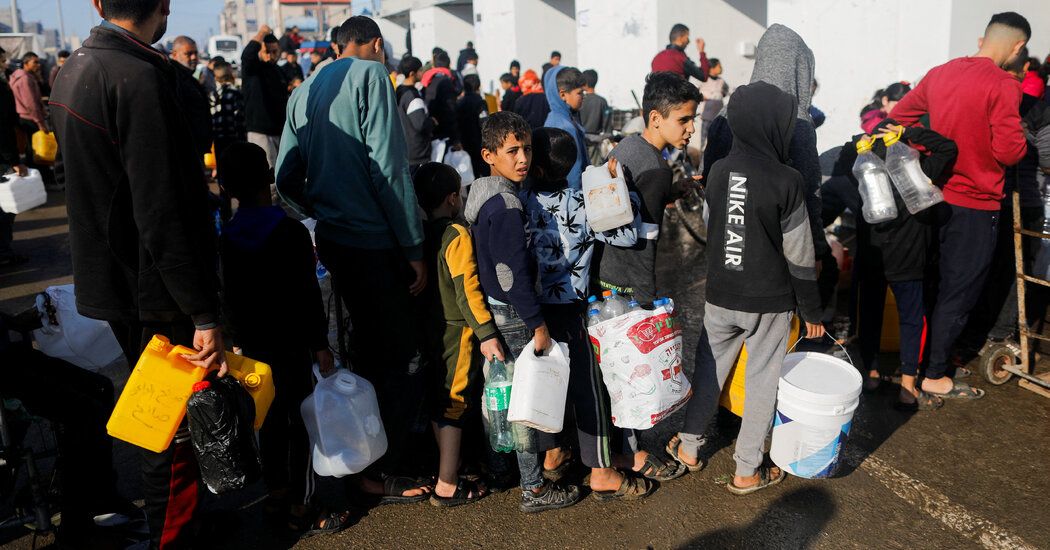The number of people facing possible famine in the Gaza Strip in the coming weeks is the largest proportion of the population at risk of famine identified anywhere since a United Nations-affiliated panel created the current insecurity assessment. world food 20 years ago.
After Hamas' surprise attack on Israel on October 7, Israel responded with air and ground strikes and a closure of the territory, which have left the 2.2 million people living there deprived of sufficient food, water and supplies. The UN has concluded that without significant intervention, Gaza could reach famine level by early February.
Limited quantities of food and other aid are entering Gaza from Israel and Egypt through heavily inspected border points; Continued shelling and ground fighting make the distribution of such aid extremely difficult.
Famine scholars say it has been generations since the world saw this degree of food deprivation in war.
“The rigor, scale and speed of the destruction of structures necessary for survival and the imposition of the siege surpasses any other case of man-made famine in the last 75 years,” said Alex de Waal, an expert on humanitarian crises. and International Law at Tufts University, who wrote “Mass Hunger: The History and Future of Famine.”
The situation in Gaza is the latest in a series of recent crises that have reversed progress against hunger. Mass deaths from starvation declined steadily from the 1980s well into the 21st century. But over the past seven years, food crises associated with conflict (such as those in Yemen, Syria and the Tigray region of Ethiopia) and those arising from environmental conditions and climate change (such as in Somalia) have led to the loss of more of a million lives.
Gaza is unique, experts say, because the people who live there are locked into the territory with no way to look for food elsewhere.
Israel has strongly denied accusations that it is responsible for food shortages in Gaza.
“There is a sufficient amount of food in Gaza,” Col. Elad Goren, head of the Israeli agency that oversees policy for the Palestinian territories, known as COGAT, said at a recent news conference.
“Israel has not and will not stand in the way of providing humanitarian aid to the people of Gaza who are not part of terrorism,” he continued. “We have not turned down a single shipment of food, water, medical supplies or shelter equipment.”
If Gazans do not have access to food, Colonel Goren said, it is due to failures by humanitarian organizations.
“Organizations desperately need to increase their capabilities to receive and distribute aid,” he said. “This includes better work processes, more facilities and trucks. Additional manpower is also needed.”
The World Food Program said that before the war, about 500 trucks a day transported supplies, including food, to Gaza, which has been under a partial blockade by Israel and Egypt since Hamas took control there in 2007. Last week, the organization said an average of 127 trucks were allowed to cross the main Israeli checkpoint each day. Distributing that limited aid is nearly impossible due to destroyed communications, fuel shortages and continued Israeli bombing, the World Food Program and other agencies say.
“Our staff doesn't feel safe distributing, and people don't feel safe going to distributions,” said Shaza Moghraby, a spokesperson for the program. “They are lining up for food, praying they don't get bombed.”
The few entry points operate intermittently due to shelling, Moghraby said, and the Israeli military's inspection and bureaucratic process means that only a limited number of aid deliveries are authorized each day.
“The need is exponentially greater now because people depend solely on humanitarian aid for their very survival,” said Juliette Touma, spokesperson for UNRWA, the agency supporting Gaza.
The assessment of the risk of famine in Gaza was carried out by 30 experts from 19 agencies, convened by the United Nations Food and Agriculture Organization. The initiative, Integrated Food Safety Phase Classification, monitors food access in approximately 50 locations around the world at a time.
In crisis zones, it monitors three criteria: whether 30 percent of children are severely malnourished or wasted; if the mortality rate exceeds twice the normal level; or if 20 percent of the population suffers from a “catastrophic” lack of food. If any of these thresholds are exceeded, the panel convenes a so-called Famine Review Committee to determine the likelihood of a famine.
Because “the F-word” is so controversial, said Cormac Ó Gráda, a famine historian and professor at University College Dublin, the hope is that declaring a famine will spur meaningful intervention, and that even a declaration of risk looming famine may spur action.
“If a famine occurs, someone is to blame, and if you can get some international body, which is considered scientific and objective, to admit that there is a famine, then it is very, very serious for the people who are considered to be hungry. caused the famine,” said Professor Ó Gráda. “So the Israelis certainly wouldn't want the UN or someone like the UN to declare that there is famine in Gaza.”
Starving civilians was a military tactic in World War II, when more than three million Soviets perished during the Nazi “starvation plan” and when the U.S. Navy and Air Force carried out a campaign officially called Operation Hunger, which blocked the delivery of food to Japan. From 1958 to 1961, at least 25 million people died in the famine associated with the Great Leap Forward in China.
Famines in Nigeria during its civil war in the late 1960s; in Sarajevo during the Bosnian war in the early 1990s; in the Syrian civil war that began 13 years ago; and in Ethiopia since 2020 are comparable to those in Gaza as sieges of civilian populations during the conflict, stated Professor de Waal.
He and other experts argued that whatever the reasons given, the underlying cause reflected deliberate decisions by those in power.
“Famine is usually caused by people, by decisions of political elites,” said Rhoda E. Howard-Hassmann, a specialist in international human rights and author of “State Food Crimes.”.” Reports from Gaza suggest a deliberate decision by Israel to restrict food, he said.
“It is a political decision or a military decision,” he said, but added: ““I am willing to accept that there are possibly other factors involved, such as Hamas corruption, Hamas food diversion, etc.”
While hunger crises in regions such as South Sudan and Tigray have unfolded with little media attention, there is intense international scrutiny of Gaza. Statements made at the beginning of the war by members of the Israeli government about their intention to starve the entire population of Gaza have drawn the attention of human rights prosecutors.
Itamar Ben-Gvir, Israel's national security minister, said in a post on explosives from the Air Force, not a gram of humanitarian aid.”
The debate over the current circumstances in Gaza – whether it is the result of a deliberate strategy to attack civilians or is an unintended and inevitable consequence of Israel's attack on Hamas – shows why it is difficult to address through international law.
The prohibition of starvation of civilians as a method of warfare entered international law in 1977, with an additional protocol to the Geneva Convention.
In 1998, the Rome Statute created the International Criminal Court and made it a war crime to use civilian starvation as a military tactic in international conflicts. The crime is described as having the objective of depriving the civilian population of food, as well as water, medicine and shelter. The United States and Israel were two of the seven countries that voted against the creation of the court.
There have been no prosecutions in international court for famine because most man-made famines since then have taken place within national borders.
In 2018, the United Nations Security Council unanimously adopted Resolution 2417, which condemned the use of starvation in conflict and said cases where armed conflict threatened to create widespread food insecurity should be referred “expeditiously.” to the Security Council.
However, the Security Council has yet to consider man-made famines: allies of countries accused of causing them have consistently acted to keep the issue out of the debate. The United States repeatedly criticized the Syrian government in the Security Council for its use of starvation, but took a softer tone when its allies Saudi Arabia and the United Arab Emirates blockaded Yemen, causing widespread famine.
Experts say it is difficult to apply international justice to famines because they are often caused by blockades in conflicts, when the blocking party may claim to prevent sustenance from reaching an insurgent or terrorist group. Since the 9/11 attacks, the idea that the need to act against terrorists takes priority over the protection of civilians has often dominated international relations, Professor de Waal said.
Catriona Murdoch, a famine legal expert at the advocacy organization Global Rights Compliance, said the question of whether there is a deliberate intent to deprive a civilian population of food and other “essential items for survival” outlined in the U.N. resolution supports whether a The food crisis is a possible crime against humanity. A famine does not have to occur for a crime to be prosecutable, she said, if intent is proven.
International justice organizations can gather evidence from Gaza now for consideration in possible later prosecution, when international institutions are more functional.
“These types of investigations take years and years to bear fruit,” Murdoch said.
Adam Sella contributed reporting from Tel Aviv.












